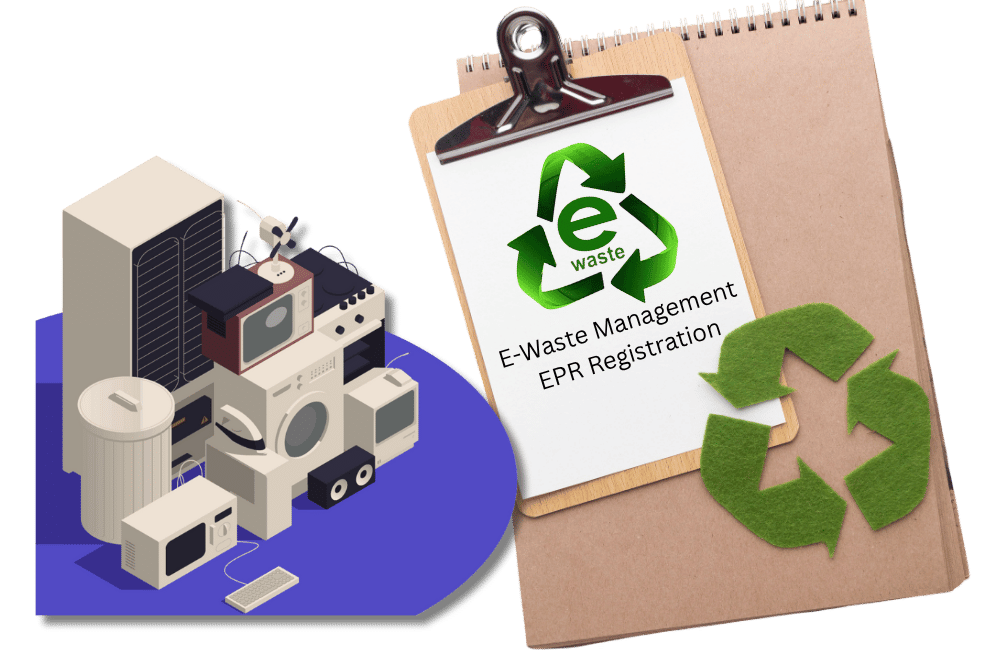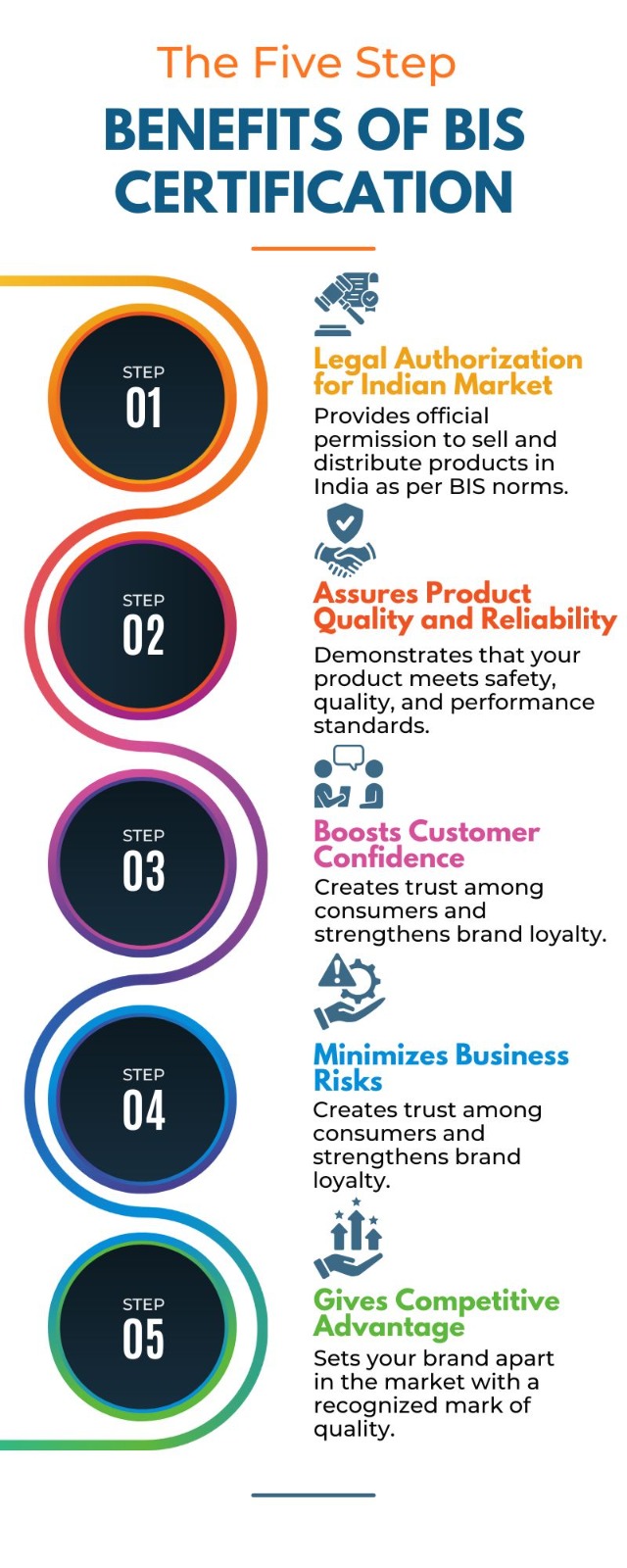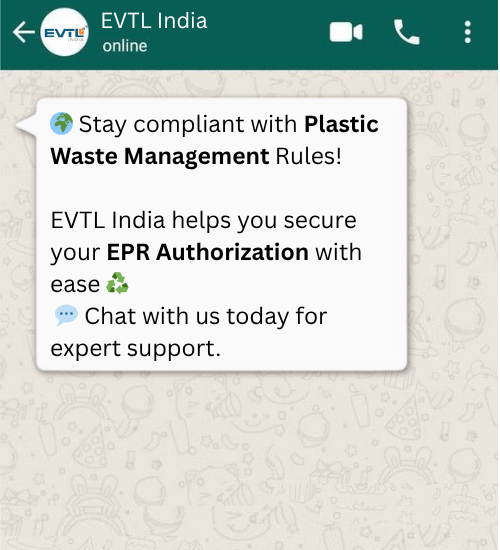Get A Quote
EPR Registration for Plastic Waste Management (PWM)
EPR Registration for Plastic Waste Management (PWM) is a mandatory compliance requirement under India's Plastic Waste Management Rules, aimed at promoting responsible environmental practices. Extended Producer Responsibility (EPR) mandates manufacturers, importers, and brand owners (MIBOs) to ensure the proper collection, recycling, and disposal of plastic packaging waste generated by their products for sustainable waste management.

- Overview
- Basic Requirements
- Certification Process
- Documents Required
- Timeline for BIS Licence
- Surveillance Inspection
- Complaint Handling
- Renewal Of BIS License
- Sample of a Grant Certificate for FMCS
- Guidelines of AIR
- Why You May Need A Consultant
- Product List
- Conclusion
- About EVTL India
- Frequently Asked Question (FAQ)
EPR Registration for Plastic Waste Management (PWM) - Overview
Plastics have become an essential part of modern life, widely used in packaging, consumer goods, and various industries. However, their non-biodegradable nature presents significant environmental challenges. In India alone, approximately 5.6 million tons of plastic waste is generated each year.

To address this growing issue, the Central Pollution Control Board (CPCB), Indian government introduced the concept of Extended Producer Responsibility (EPR) through the Plastic Waste Management Rules, 2016. EPR holds producers, importers, and brand owners accountable for managing the plastic waste generated from their products. This responsibility includes adopting eco-friendly practices such as recycling, reusing materials, and ensuring proper end-of-life waste management.
Understanding Extended Producer Responsibility (EPR)
Extended Producer Responsibility (EPR) assigns accountability to manufacturers, importers, and businesses for managing the waste generated throughout the entire life cycle of their products, specifically focusing on plastic packaging. This framework ensures that stakeholders are responsible not only for producing goods but also for collecting, recycling, and properly disposing of them once they are either consumed or reach the end of their useful life.
Under the EPR Registration for Plastic Waste Management (PWM), PIBOs (Producers, Importers, Brand Owners) are obligated to handle their plastic packaging waste in an environmentally sustainable manner. This includes implementing waste management strategies such as reprocessing, co-processing, converting plastic to oil, road construction, and waste-to-energy technologies. These approaches aim to address plastic waste issues effectively and reduce environmental impact.
Plastic Waste Management Rules
The Plastic Waste Management Rules, 2016, along with subsequent amendments—particularly the February 2022 Amendment—have established more precise guidelines for implementing Extended Producer Responsibility (EPR) in plastic packaging. These amendments clearly define the roles and responsibilities of Producers, Importers, and Brand Owners (PIBOs), while also outlining mechanisms to monitor the collection and take-back of plastic waste. To ensure compliance, the rules introduced several enforcement tools, including the EPR Portal launched by the Central Pollution Control Board (CPCB) to streamline reporting and accountability.
Why is EPR Registration Important?
EPR registration will ensure that PIBOs adhere to India's Plastic Waste Management Rules and work towards a cleaner, sustainable environment. Companies intending to register depict their commitment to reduce the footprint of plastic waste, improve the chain of waste management, and decrease environmental impairment due to plastic pollution. More importantly, any non-compliance invites fines and penalties under the Environmental Compensation Levy.
Plastic Packaging Categories under EPR
Plastics under the rules of PWM is classified into two categories:

Process of EPR Registration for PIBOs/PWPs
Required Documents for Plastic Waste Management
| Producer | Importer | Brand Owner |
|---|---|---|
| GST Certificate | GST Certificate | GST Certificate |
| Company Pan Card | Company Pan Card | Company Pan Card |
| Certificate of Incorporation | Certificate of Incorporation | Certificate of Incorporation |
| IEC copy ( If any) | IEC copy | Product images that you are selling in themarket |
| Product images (Raw Material) | Product images with plastic packaging | Product imagewith plastic packaging |
| Aadhar and Pan card of authorized signatory | Product name and images that you are selling in the market | Aadhar and Pan card of authorized signatory |
| Udyam Certificate | Aadhar and Pan card of authorized signatory | Udyam Certificate (IF ANY) otherwise please confirm your last year turnover. |
| E-Mail Id &Contact Number Of Authorized Person | Udyam Certificate ( If any) otherwise please confirm that last year turnover ) | E-Mail Id &Contact Number Of Authorized Person |
| Any one Purchase invoice ( Import) of 21-22 and 22-23 | E-Mail Id& Contact Number of Authorized Person | Any one purchase invoice of 21-22 and 22-23 |
| Any one Sale invoice (domestic) of 21-22 and 22-23 | Any one Purchase invoice (Import) of 22-23 and 23-24 | Scanned copy of company stamp and signature ( foruploading on the portal) |
| Scanned copy of company stamp and signature ( for uploading on the portal) | Any one sale invoice (domestic) of 22-23 and 23-24 | Copy of Company Letterhead |
| Copy of Company Letterhead | Bank details | Last 2 financial year weight, you are using in your product for packaging |
| Flow Diagram Of Manufacturing Process Showing Input And Output In Terms Of ProductsAnd Waste Generated Including For Captive Power Generation And Water | Scanned copy of company stamp and signature ( for uploading on the portal) | |
| Consent letter of Air and Water Act | Copy of Company Letterhead | |
| Pictures of the facility - Raw material storage area, Production process, Products dispatch area | Last 2 financial year plastic packagingmaterial, you have using in your product for packaging ( weight) | |
| Latest Electricity bill | ||
| Disaster management plan | ||
| Plant Machinery details – Name of machine,Power rating (kwh),Operating hours(h),Processing Capacity (weight),Image of machine | ||
| Product Images ( produced ) | ||
| Total production capacity (weight) | ||
| Plot Area of theFacility (sqm) | ||
| Note: Micro & Small scale of companies are exempted in plastic EPR certification only medium and large scale will apply. | ||
EPR Registration for Plastic Waste Management Fees
| No | Type of fees/Charges | Amount |
|---|---|---|
| 1 | Government Fees | 10,000/- |
| 2 | Service Fees | 10,000 - 15,000/- |
Conclusion
The Extended Producer Responsibility (EPR) regime plays a pivotal role in India's approach to sustainable plastic waste management. By making producers and businesses responsible for the waste their products generate, EPR promotes a circular economy where materials are efficiently reused and recycled. The Central Pollution Control Board’s (CPCB) EPR portal provides a comprehensive framework to enhance transparency, accountability, and compliance throughout the waste management process. Although challenges persist, the effective implementation of EPR has the potential to drastically reduce plastic waste's environmental impact, moving India toward a more sustainable and eco-friendly future.
EVTL India is one of the leading consultants in the field of Extended Producer Responsibility (EPR) registration, assisting companies in navigating the complex regulatory requirements of plastic waste management in India. With extensive expertise in EPR compliance, EVTL India helps producers, importers, and brand owners (PIBOs) obtain EPR registration, ensuring they adhere to India's Plastic Waste Management Rules. Their comprehensive services include guiding entities through the registration process, maintaining compliance, and implementing sustainable waste management strategies, thereby contributing to a cleaner and more eco-friendly environment.
Frequently Asked Questions (FAQ)
Our Services
News & Updates









